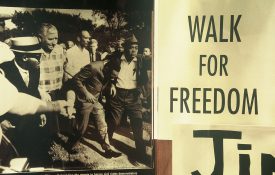-
Name-Brand or Generic? Your Political Ideology Might Influence Your Choice
Conservatives and liberals don’t just differ when it comes to politics, they may also make different purchases at the grocery store, according to new research published in Psychological Science, a journal of the Association for Visit Page
-
Conflicting Cultural Identities May Foster Political Radicalism
New research suggests that dual-identity immigrants — first-generation immigrants and their descendants who identify with both their cultural minority group and the society they now live in — may be more prone to political radicalism Visit Page
-
Claims of ‘post-racial’ society and other denials of racism may reflect ignorance of history
Asian News International: New research has suggested that commonly observed differences in how groups perceive racism may be explained by ignorance about, and even denial of, the extent of racism over the course of history. Visit Page
-
In the Land of the Free, Interdependence Undermines Americans’ Motivation to Act
Public campaigns that call upon people to think and act interdependently may undermine motivation for many Americans, according to new research published in Psychological Science, a journal of the Association for Psychological Science. Americans are Visit Page
-

Claims of “Post-Racial” Society and Other Denials of Racism May Reflect Ignorance of History
Commonly observed differences in how groups perceive racism may be explained by ignorance about — and even denial of — the extent of racism over the course of history, a psychology study suggests. Visit Page
-
Too Big, Too Small? Optimal Circle Of Friends Depends On Socioeconomic Conditions, Goldilocks
Science 2.0: Do you prefer to have a few close friends or a larger social circle that is less deep? Social psychologists say your preference reflect your personality but also individual circumstances – like socioeconomic Visit Page

